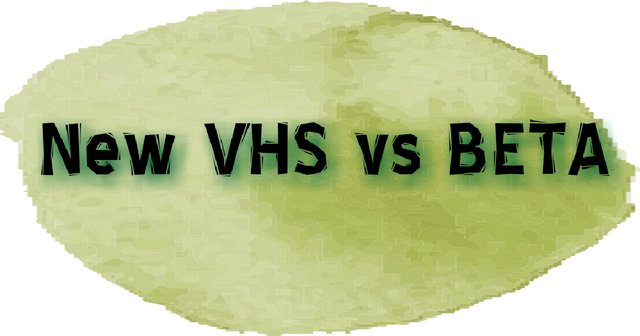The New VHS vs BETA
Woohoo! Standards fight!
Okay, so that's not as much fun as shouting "food fight!" in a crowded cafeteria.
But it's still fun.
Many of you, possibly without even knowing it, have participated in a standards fight before.
even knowing it, have participated in a standards fight before.
Remember VHS vs. Beta?
This was the fight for the VCR (which is what the world used before DVDs).
Beta, which was Sony's standard, recorded an hour of beautiful high-quality video.
VHS couldn't match Sony's quality.
But you could record for two hours (and eventually four).
The two video formats (and machines) were incompatible.
So consumers had to pick one and stick with it.
VHS won out and everyone who bet on Sony lost.
VHS vs. Beta is likely the most famous standards battle in recent history.
But there have been others, like Blu-ray vs. HD DVD, Mac vs. PC
and alternating current vs. direct current.
Now the blockchain world is getting its own standards fight.
This battle isn't for consumers (yet).
It's for enterprise class solutions - blockchain for businesses.
The two (for now) competing entities in this fight are Hyperledger
and the Enterprise Ethereum Alliance (EEA).
The EEA is made up of 500 companies, including Credit Suisse, Hewlett Packard, ING, Samsung, Shell and Toyota.
And it just released the first version of its open-source framework to speed up and automate business transactions.
As the name of the group suggests, the EEA is using Ethereum as its blockchain platform.
Unlike the EEA, which can use Ethereum or tokens based on the Ethereum blockchain, Hyperledger doesn't have a native currency.
But it does have a similar mission. It wants to "build a new generation of transactional applications that establishes trust, accountability and transparency at their core, while streamlining business processes and legal constraints."
Hyperledger also has a series of heavy hitters contributing to its development:
IBM, Intel, Fujitsu, Deutsche Bank and SAP. Hyperledger is hosted by The Linux Foundation.
Before we get too carried away with this standards fight, we should note there are a few companies hedging their bets.
Cisco, Accenture, Deloitte and J.P. Morgan, among others, are betting on both.
So what does all of this mean to you, the investor?
In the short term, this is good news for Ethereum.
Last week, the EEA launched the first version of its Enterprise Ethereum Protocol .
(Hyperledger Fabric 1.0 came out last year.)
And while the technical details of this standard mean something to developers,
the important takeaway for investors is that the use case for Ethereum just improved.
And ultimately, that's important.
Whether it's as a store of value, an enterprise software solution or something else, cryptocurrencies need a use case
- and Ethereum is clearly demonstrating one here.
In the long term, this is another factor to take into account as you evaluate investment opportunities.
What environment are they developing in?
Which standard is gaining momentum?
And are those decisions following market trends?
In the end, all of this is good news for cryptocurrencies and blockchain tech. And we should all celebrate that.
Congratulations @ovada! You have completed some achievement on Steemit and have been rewarded with new badge(s) :
Click on any badge to view your Board of Honor.
For more information about SteemitBoard, click here
If you no longer want to receive notifications, reply to this comment with the word
STOPDo not miss the last announcement from @steemitboard!